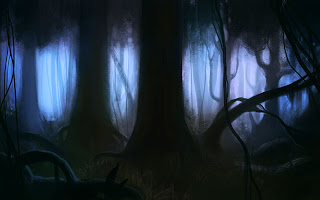How to Write a Novel or "Wood Craft"
Students and other emerging writers often ask me, “How, precisely, do you write a novel?”
I suspect they think, as perhaps I did myself once upon a time, that there exists somewhere a hermetically sealed room, guarded by hydras, in which Real Writers have placed, in a locked chest in turn submerged in a shark-infested tank of acid (which magically doesn’t harm the sharks — this is fiction, people!) the secrets to writing.
 The mythical hydra — the heads are literary critics
The mythical hydra — the heads are literary critics
Doesn’t it though?
But the truth remains, such a quest would be quite simple compared to wandering off into the uncharted dark paths leading through the tangle-rooted forest of your own mind with neither map nor guide to assist you. Once you enter, who knows if you will ever leave? Who knows what beasties you might encounter? What bottomless bogs, what leg traps, what blind-fog hollows, what sheer cliff drops might await you? Who knows what enchantments might ensnare you?
The point is that even if there were a special, secret-handshake, labyrinth-encoded, sacred-apron-guarded set of instructions, and even if you went through all the peril and effort to retrieve it, the truth was you’d still have to follow those instructions, and there you’d be, standing at the edge of that foreboding wood once again, wondering if you had the courage and perseverance to begin the journey.
Fine, you say, all very Jungian. All very archetypal and mythological. But, really, how do you DO it?
Okay, all right. I’ll tell you. You start walking into the wood, one foot at a time. You surrender, utterly, to the journey, and let it take you where it will. You accept you are not really in charge (sort of like faith, yes?). Well, you might be in charge to an extent. You can always decide not to go into the woods, but if you’re a Real Writer, the woods will always call. And, once in the woods, you can always decide whether to enter the cave or not, dive in the well, take the path to the left or right, and so on. What I mean is you have to commit to the journey. Good or bad. Painful or joyous. Whether you find friendly talking fawns as guides, or slavering wolves. Got it? Right? So. Off you go.
Nice metaphor, you say. But really, how do you DO it?
Oh, for heaven’s sake. Well, you might try writing. By which I mean — to really milk this metaphor thing — I assume that no one would set off on any kind of a journey, especially not one of undefined length, into dark, uncharted territory, without adequate supplies. And for a writer that means you have a knowledge of your craft, you:
- know how to construct decent sentences and paragraphs,
- understand how to reveal character — dialogue, clothing, gestures, thoughts, actions, that sort of thing,
- write in concrete significant details rather than droopy abstraction,
- you understand conflict, pace, setting and so forth
If you don’t know those things, you need to go back to a teacher, or to any number of good texts on writing, and learn your ‘wood craft.’ (Sorry, couldn’t help myself.) In fact, here are a few of the books I recommend to get you started:
- Writing Fiction, by Janet Burroway (excellent, except for the chapter on point of view, which makes it far more complicated than it need be, I think). Doesn’t matter which edition.
- From Where You Dream by Robert Olen Butler. He says, “Fiction is the art form of human yearning.” If you don’t get that, you lose your way pretty darn fast.
- The Art of Fiction, by John Gardner
- The Practice of Writing, by David Lodge.
- 45 Master Characters, by Victoria Lynn Schmidt. Most useful for her wisdom on how to map out the feminine and masculine journeys — see my note below about what to do as you move deeper into the woods.
There are others, but they’ll get you started. If you want more, ask me. If you want my opinion on a writing text, ask me, and if I have an opinion, I’ll share it. There are an awful lot of really bad writing books out there, and God knows, over the years I’ve read most of them.
You will also need to read the works of other writers. LOTS of them. I’m always amazed by the number of students I have who say they want to be writers, but they don’t like reading. They don’t want to be writers at all. They want to be authors — there’s a difference. One involves a lot of money, fame, and appearances on the television. The other involves a lot of thought, reflection, reading, solitude and devotion. I’ll let you figure out which is which.
But you’ve done all that. And better yet, you have an idea — that slight, barely-visible twinkle somewhere in the middle of the wood.
Now what?
You put your pen down on the page (you know, foot into the forest), and you follow it. One word after another, one sentence after another, one paragraph after another.
Wood craft —
- Don’t keep trying to backtrack — move forward to the end of your journey. You don’t want to get caught in Re-write Land (A terrible place where writers are doomed to write the first 100 pages of their novels over and over and over again, never moving foward, never finishing. Shudder.)
- Trust your intuition. If you truly find yourself in the Clearing of Immobility, where none of your characters will do what you want, in fact none of them will do anything at all — they stand
there, whimpering. Retrace slightly (see note above), only slightly, until a new trail appears, and then run like hell down that for a while. - Take note of your surroundings and write about that as you go. Emotional setting, as well as physical setting is important. As you move deeper into the woods, you might want to draw a map — call it an outline, if you will.
- Set yourself travel goals. When you first set out, be easy with yourself until your muscles adjust. 500 words a day is a good beginning. But that means you have to GO FORWARD by 500 words a day. So, if you start your journey every day, as I do, by reading what you wrote yesterday, and it sucks, well, I guess you’re writing 1,000 words a today.
- This means EVERY DAY. Not when the inspiration strikes you. Not when your kids don’t have after-school activities. Not when you’ve finally cleared out that closet. Not when your in-laws aren’t visiting. EVERY DAY. (See that bit on surrendering to the journey, above).
- If you miss a day, I KNOW, I KNOW, then get back on the path as soon as you can, recognizing that it is a hell of a lot easier to keep moving than it is to start all over again. Robert Leckie says that every day when you go into your office to work you have to shoot the bear under your desk. Imagine how many bears pile up under there after three weeks.
- Nourish yourself as you go. Eat properly. Sleep enough. Go for walks. Enjoy the company of supportive loved ones. But don’t talk too much about your book. You can either talk about a book or write it, in my experience.
- Learn a few incantations of your own. Prayer, in my experience is good. But you might need other magical words, like, “Sorry, I can’t do that, I’m writing.” or “Much as I’d love to have you and your six charming children come for a visit, I’m afraid I’m writing now and can’t be disturbed.” or “Actually, my darling, I don’t think the entire world will come to an end if I don’t do the dishes for a couple of hours and keep writing., which might be followed by, “Might I suggest, my sweet, you support your local writer by doing the flippin’ dishes yourself?” You can also use certain magical gestures, like unplugging the phone, or shutting down the email, or even putting a note on the door — DANGER! DO NOT DISTURB, WRITER AT WORK. — Part of surrendering to the writers’ life and the journey is making it a priority.
- Make sure while you’re in the woods that the bills are paid (and this might mean working at a job that keeps you bank account in the green while not overtaxing your imagination), your partner knows you love them, that you aren’t over-indulging in booze and drugs (which just destroy your compass entirely), that you aren’t getting wrapped up in the squabbles and turf wars of family and friends… In short — banish distractions and chaos. And if you have too much drama in your life, how can you concentrate on the work? Keep the drama for the page.
- Learn to ignore the whisperings of Insecurity Elves, or Envy Elves (a particularly dangerous breed), or the dreaded Elves of Hopelessness and Pointlessness. They are well known liars.
And that, really is all there is to it. Snort. The best advice I ever received was — keep writing. Should you do that, day after day, consistently, about 1,000 words a day, then at the end of three months, more or less, you’ll have a first draft. It will then take you, oh, probably, another year to craft this draft into decent-enough shape to send out to an agent… but that’s a walk in entirely different woods.
So, here’s the final secret – you stand at the edge of the same wood, having to muster up the same discipline, courage and faith, with every single novel, and it never gets easier. The good news is, your stores of necessary items — that discipline, courage and faith — are magical, and every time you think you’ve depleted them, by grace and enchantment – presto! – they are filled again.
Now, off you go. And please make friends with a dove or two. Ask them to carry a message out of the wood now and then so I know how you’re doing.
Copyright 2008 Lauren B. Davis For permissions: laurenbdavis.iCopyright.com


